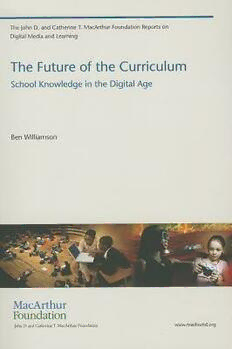Table Of ContentThe Future of the Curriculum
This report was made possible by grants from the John D. and Catherine
T. MacArthur Foundation in connection with its grant making initiative
on Digital Media and Learning. For more information on the initiative
visit http://www.macfound.org.
The John D. and Catherine T. MacArthur Foundation Reports on
Digital Media and Learning
Peer Participation and Software: What Mozilla Has to Teach Government by
David R. Booth
The Future of Thinking: Learning Institutions in a Digital Age by Cathy N.
Davidson and David Theo Goldberg with the assistance of Zoë Marie Jones
Kids and Credibility: An Empirical Examination of Youth, Digital Media Use,
and Information Credibility by Andrew J. Flanagin and Miriam Metzger with
Ethan Hartsell, Alex Markov, Ryan Medders, Rebekah Pure, and Elisia Choi
New Digital Media and Learning as an Emerging Area and “Worked Examples”
as One Way Forward by James Paul Gee
Digital Media and Technology in Afterschool Programs, Libraries, and Museums
by Becky Herr-Stephenson, Diana Rhoten, Dan Perkel, and Christo Sims
with contributions from Anne Balsamo, Maura Klosterman, and Susana
Smith Bautista
Young People, Ethics, and the New Digital Media: A Synthesis from the GoodPlay
Project by Carrie James with Katie Davis, Andrea Flores, John M. Francis,
Lindsay Pettingill, Margaret Rundle, and Howard Gardner
Confronting the Challenges of Participatory Culture: Media Education for the
21st Century by Henry Jenkins (P.I.) with Ravi Purushotma, Margaret Wei-
gel, Katie Clinton, and Alice J. Robison
The Civic Potential of Video Games by Joseph Kahne, Ellen Middaugh, and
Chris Evans
Quest to Learn: Developing the School for Digital Kids by Katie Salen, Robert
Torres, Loretta Wolozin, Rebecca Rufo-Tepper, and Arana Shapiro
Measuring What Matters Most: Choice-Based Assessments for the Digital Age
by Daniel L. Schwartz and Dylan Arena Learning at Not-School? A Review of
Study, Theory, and Advocacy for Education in Non-Formal Settings by Julian
Sefton-Green
Stealth Assessment: Measuring and Supporting Learning in Games by Valerie
Shute and Matthew Ventura
The Future of the Curriculum: School Knowledge in the Digital Age by Ben Wil-
liamson
For a complete list of titles in this series, see http://mitpress.mit.edu/books/
series/john-d-and-catherine-t-macarthur-foundation-reports-digital
-media-and-learning.
The Future of the Curriculum
School Knowledge in the Digital Age
Ben Williamson
The MIT Press
Cambridge, Massachusetts
London, England
© 2013 Massachusetts Institute of Technology
All rights reserved. No part of this book may be reproduced in any
form by any electronic or mechanical means (including photocopying,
recording, or information storage and retrieval) without permission
in writing from the publisher.
MIT Press books may be purchased at special quantity discounts for
business or sales promotional use. For information, please email spe-
[email protected] or write to Special Sales Department, The
MIT Press, 55 Hayward Street, Cambridge, MA 02142.
This book was set in Stone Sans and Stone Serif by the MIT Press. Printed
and bound in the United States of America.
Library of Congress Cataloging-in-Publication Data
Williamson, Ben (Educator).
The future of the curriculum : school knowledge in the digital age / Ben
Williamson.
pages cm.—(The John D. and Catherine T. MacArthur Foundation
reports on digital media and learning)
Includes bibliographical references.
ISBN 978-0-262-51882-6 (pbk. : alk. paper) 1. Education—Curricula. 2.
Curriculum planning. 3. Education—Effect of technological innova-
tions on. 4. Digital media. I. Title.
LB1570.W5765 2013 375'.001—dc23 2012038069
10 9 8 7 6 5 4 3 2 1
Contents
Series Foreword vii
1 Introduction: Prototyping and Researching the Curriculum of
the Digital Age 1
2 Curriculum Change and the Future of Official Knowledge 15
3 Networks, Decentered Systems, and Open Educational
Futures 31
4 Creative Schooling and the Crossover Future of the
Economy 47
5 Psychotechnical Schools and the Future of Educational
Expertise 65
6 Globalizing Cultures of Lifelong Learning 85
7 Making Up DIY Learner Identities 101
8 Conclusion: An (Un)official Curriculum of the Future? 115
Notes 125
Series Foreword
The John D. and Catherine T. MacArthur Foundation Reports on
Digital Media and Learning, published by the MIT Press in col-
laboration with the Monterey Institute for Technology and Edu-
cation (MITE), present findings from current research on how
young people learn, play, socialize, and participate in civic life.
The Reports result from research projects funded by the MacAr-
thur Foundation as part of its $50 million initiative in digital
media and learning. They are published openly online (as well as
in print) in order to support broad dissemination and to stimu-
late further research in the field.
1 Introduction: Prototyping and Researching the
Curriculum of the Digital Age
Digital media and learning has become a critical area for educa-
tional research in the twenty-first century. Yet little research has
been carried out on the practical and conceptual implications
for the school curriculum in the digital age. This report asks a
very simple question: what might be the future of the curricu-
lum in the digital age? It examines a series of twenty-first cen-
tury curriculum innovations in order to show how various ideas
about the future curriculum are now being styled into school
practice, and it seeks to understand the emerging issues raised by
meshing the curriculum and digital media together.1 It explores
a range of contemporary social, political, economic, and cultural
issues facing the future of the curriculum and examines the pro-
duction of ideas about the practical organization and planning
of a future curriculum. What kinds of visions for the curricu-
lum of the future are being imagined, invented, and promoted?
The main argument is that any curriculum always represents a
certain way of understanding the past while also promoting a
particular vision of the future. To use pragmatist philosopher
William James’s metaphor, the curriculum is a “saddleback”

